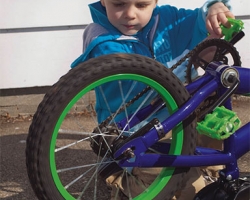Cycling tips from the Culver City Bicycle Coalition
Riding a bicycle has many well-known benefits, including increased physical fitness, decreased stress levels and lower environmental impact, in addition to the economic benefits discussed in last week’s column. What is not so well-known is that bicycle riding and physical exercise in general, has a beneficial effect on academic performance.
In the past decade, there has been an explosion of articles describing the strong correlation between fitness levels and academic performance in children. This research has garnered the interest of education policy makers interested in increasing academic test scores. A study was performed by the California Department of Education in 2005, using Physical Fitness Test and California Standards Test scores from fifth-, seventh- and ninth-grade students. The study found a significant positive correlation between physical fitness scores and academic scores across grade levels, gender and socioeconomic status.
Of course, correlation is not the same as causation, which is why a 2009 study by Dr. Charles Hillman of the University of Illinois is so interesting. Hillman’s group investigated the immediate effects of exercise by having 20 school-aged children complete cognitive tests in two sessions, one after 20 minutes of aerobic exercise on a treadmill, and one without the exercise. The results showed that aerobic exercise increased performance on academic tests (reading comprehension, spelling and arithmetic), in addition to increasing accuracy and decreasing response time on a cognitive function test.
With regard to the particular benefits of cycling, the story of Adam Leibovitz is instructive. Leibovitz was diagnosed with Attention Deficit Hyperactivity Disorder (ADHD) as a first-grader, and was prescribed the drug Ritalin at age 10. He also started riding a bicycle as a young boy, and by the time he was in high school, he was competing in national races. During his training, he noticed that after hard weekend training sessions he could concentrate better even without taking his medication. He began to use cycling to control his condition, to the point that he was completely off medication by the time he went to college.
Leibovitz’s full story can be found in an article by Bruce Barcott on the Bicycling magazine Web site (search for Riding is My Ritalin). The article includes several references to other studies on cycling, exercise, ADHD and academic performance.
The academic benefit of exercise is one of many reasons why programs encouraging kids and parents to walk or bike to school are so important. For example, Safe Routes to School programs, which exist at both at the federal and state level, provide grant money to schools and local governments to make it safer and easier for kids and parents to walk or ride to school. Culver City was recently awarded a Safe Routes grant for bicycle and pedestrian improvements around Linwood Howe Elementary School. These improvements will be implemented over the next couple of years, and the city plans to submit grants for the other schools in the district. The specific details of the improvements will be described in next week’s column.
Route of the Week:
Here’s a great way to use the Ballona Creek Bike Path to get to the Helms Bakery area. Enter the Ballona Creek Bike Path in Culver City at Sawtelle Boulevard, Sepulveda Boulevard, the bridge near Lindberg Park, Overland Avenue or Duquesne Avenue. Ride East until the end of the bike path at Syd Kronenthal Park. Exit the park, ride on any of the northbound residential streets and turn left on Jacob Street. Ride to the end, and turn right on Helms Avenue. Cross Washington Boulevard to get to the new Helms Bakery pedestrian zone, and park at the bike racks.
Bike Safe, Bike Smart! is a weekly column to promote responsible cycling by providing information, education and advice about riding. It’s written by members of the Culver City Bicycle Coalition (CCBC), a local chapter of the Los Angeles County Bicycle Coalition. Join them for their family bike ride the last Sunday of every month. For more information and to submit your questions, write: ccbicyclecoalition@gmail.com, and visit their Web site: culvercitybc.wordpress.com/.

